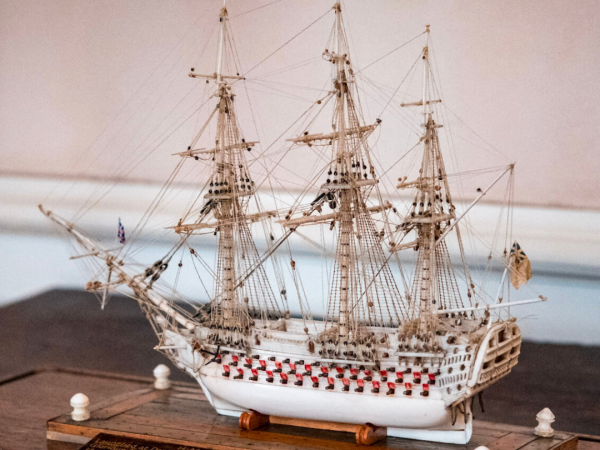The Arts and Crafts of Napoleonic Prisoners of War
During the Napoleonic Wars, 200,000 prisoners of war were brought to Britain with many remaining in captivity for up to eleven years.
These men had to occupy their time using their imagination and ingenuity. They are famous for their manufacture of bone ships, guillotines, automatons, and straw marquetry boxes and paintings. They helped to introduce the game of dominoes into Britain. Some prisoners produced oil and watercolours of the scenes around them. The prisoners at Portchester Castle constructed a theatre in the basement of the keep where they staged musicals, dramas, and comedies.
Other prisoners indulged in activities that conflicted with the law, such as the forgery of banknotes, manufacture of pornography, and the illicit manufacture of straw plait.
This talk tells the story of this prisoner of war activity, explaining why these models' helped men with post-traumatic stress after experiencing intense action on land or sea. It is illustrated with images of bone ships, automatons, domino boxes and forged banknotes; seen in museum collections around the country.
Arundells itself holds four remarkable bone ships made by prisoners from this period — part of a unique legacy of craftsmanship born from captivity.


Date: Wednesday 25 March
Time: Doors from 13.45, talk starts 14.00
Where: Arundells, 59 The Close, Salisbury SP1 2EN
Tickets: £16
All tickets are non refundable but you are very welcome to pass them on to friends or family if you are unable to attend.
Paul Chamberlain
Before retiring, Paul Chamberlain worked as a Government Scientist. A lifelong enthusiast of the Napoleonic period, his particular focus is on the experiences of prisoners of war during that era.
He serves on the Committee of the Waterloo Association and is Editor-in-Chief of The Napoleon Series website. Paul was a member of the Norman Cross Eagle Appeal, which restored the memorial to the 1,770 prisoners who died at the Norman Cross Prison Depot between 1797 and 1814, and acted as a consultant for the Time Team excavation at the site in 2009.
Since the Nene Park Trust assumed responsibility for the Norman Cross site, Paul has continued his involvement as a consultant, helping to develop new information panels and digital presentations that tell the story of the prison.
He is the author of two books:
Hell Upon Water: Prisoners of War in Britain 1793–1815 (The History Press, 2008)
The Napoleonic Prison of Norman Cross: The Lost Town of Huntingdonshire (The History Press, 2018)
Paul regularly gives talks across the country on Napoleonic history and the lives of prisoners of war.
Ticket options
During the Napoleonic Wars, 200,000 prisoners of war were brought to Britain with many remaining in captivity for up to eleven years.
These men had to occupy their time using their imagination and ingenuity. They are famous for their manufacture of bone ships, guillotines, automatons, and straw marquetry boxes and paintings. They helped to introduce the game of dominoes into Britain. Some prisoners produced oil and watercolours of the scenes around them. The prisoners at Portchester Castle constructed a theatre in the basement of the keep where they staged musicals, dramas, and comedies.
Other prisoners indulged in activities that conflicted with the law, such as the forgery of banknotes, manufacture of pornography, and the illicit manufacture of straw plait.
This talk tells the story of this prisoner of war activity, explaining why these models' helped men with post-traumatic stress after experiencing intense action on land or sea. It is illustrated with images of bone ships, automatons, domino boxes and forged banknotes; seen in museum collections around the country.
Arundells itself holds four remarkable bone ships made by prisoners from this period — part of a unique legacy of craftsmanship born from captivity.


Date: Wednesday 25 March
Time: Doors from 13.45, talk starts 14.00
Where: Arundells, 59 The Close, Salisbury SP1 2EN
Tickets: £16
All tickets are non refundable but you are very welcome to pass them on to friends or family if you are unable to attend.
Paul Chamberlain
Before retiring, Paul Chamberlain worked as a Government Scientist. A lifelong enthusiast of the Napoleonic period, his particular focus is on the experiences of prisoners of war during that era.
He serves on the Committee of the Waterloo Association and is Editor-in-Chief of The Napoleon Series website. Paul was a member of the Norman Cross Eagle Appeal, which restored the memorial to the 1,770 prisoners who died at the Norman Cross Prison Depot between 1797 and 1814, and acted as a consultant for the Time Team excavation at the site in 2009.
Since the Nene Park Trust assumed responsibility for the Norman Cross site, Paul has continued his involvement as a consultant, helping to develop new information panels and digital presentations that tell the story of the prison.
He is the author of two books:
Hell Upon Water: Prisoners of War in Britain 1793–1815 (The History Press, 2008)
The Napoleonic Prison of Norman Cross: The Lost Town of Huntingdonshire (The History Press, 2018)
Paul regularly gives talks across the country on Napoleonic history and the lives of prisoners of war.




